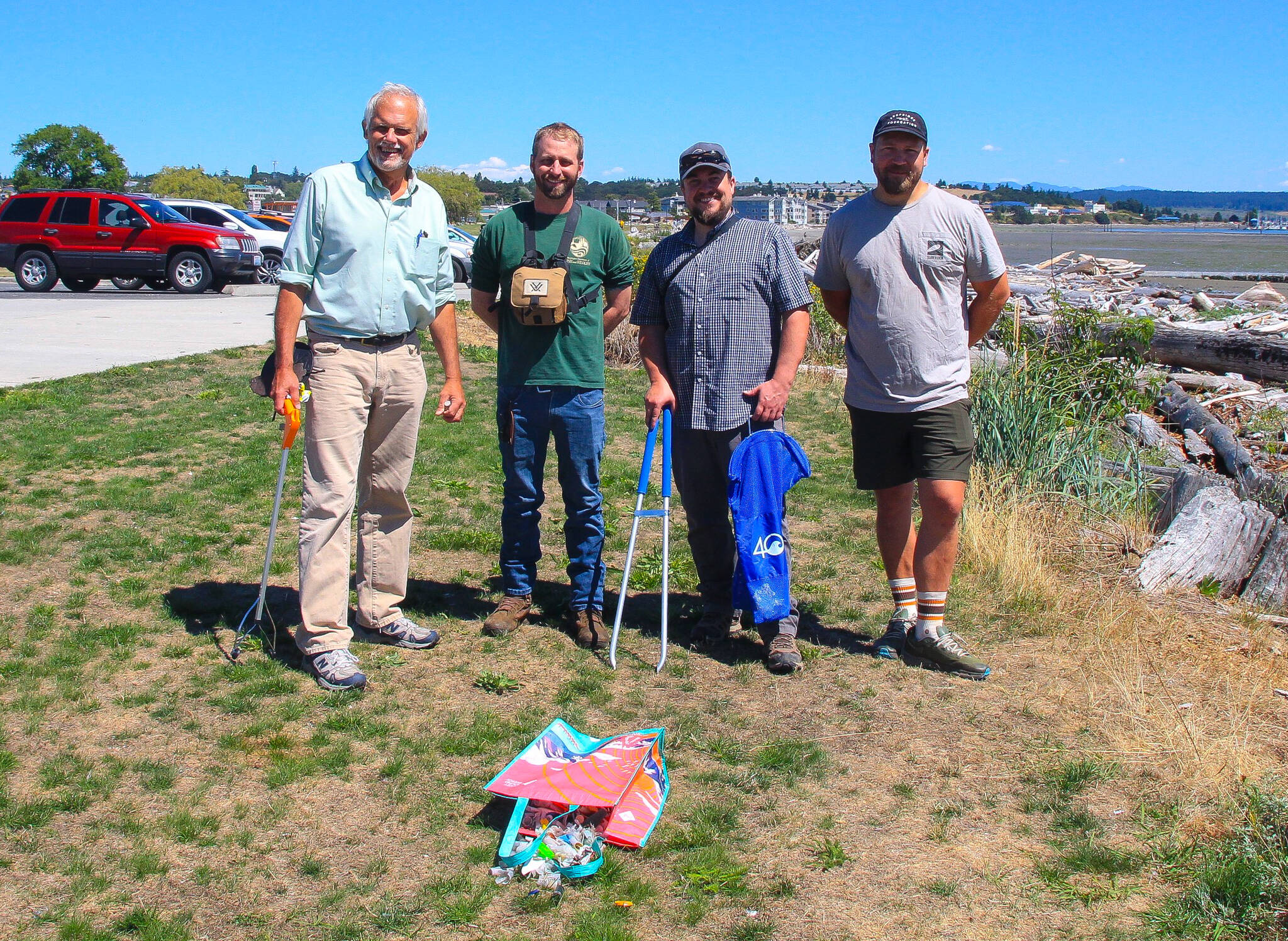Strolling on the beach, one can easily notice the colorful microplastics sprinkled on the sand, sometimes so small it’s impossible to guess what object they once were part of. For 27 years, volunteers at Washington State University’s Community Litter Cleanup Program — also known as CLPC — have been picking up trash from the beaches in Island County. But it wasn’t until about four years ago that they noticed they had been reliably finding the same flower-shaped object: shotgun wads.
Darwin Christopherson has been a volunteer at CLCP for seven years. Every Tuesday, he meets with other CLCP volunteers to comb “the dandruff of our society,” as he likes to say, out of the local beaches.
“It seems to be the number one identifiable piece of plastic that the trash pickers pick up,” he said.
Shotgun wads are the part of a shotgun shell that separates the pellets from the powder. When shooting, the wads are fired out of the barrel, often into the water where they cannot be retrieved.
Though they are found everywhere, Oak Harbor shores have an inordinate amount of such debris. According to Christopherson, Oak Harbor happens to be the wads’ favorite destination due to its position in the Salish Sea and the currents that carry debris from major deltas such as the Skagit, Stillaguamish and Snohomish deltas. Even though waterfowl hunting season runs between fall and winter, these objects keep washing up on North Whidbey shores on a daily basis.
Kyle Spragens oversees waterfowl hunting for the Washington Department of Fish and Wildlife.
“It used to not be a problem,” he said. “Shotgun shells used for waterfowl hunting were made out of biodegradable materials. It wasn’t until plastics came on the scene in the ‘60s and ‘70s that that sort of industry drifted towards a cheaper option to get their hands on.”
On Aug. 2, a small group that included Christopherson and Spragens collected 100 wads in 20 minutes. On June 27, volunteers found 263. On May 30, 468. On April 11, more than 300.
All of these were found in Windjammer Park alone.
Most duck hunters Christopherson has met are environmentally conscious, but are often unaware that the wads represent an issue at all as they may not be able to see them shoot out of their shotguns into the water. Aware or not, Christopherson believes hunters are not the problem, but the industry. It would be unfair to ban plastic wads in the absence of an available alternative.
The issue was also brought to the attention of Island County Commissioner Melanie Bacon.
“So much of our environmental concerns have really difficult solutions, or we don’t even see what the solution is,” she said. “This is one that has a pretty basic solution.”
According to Spragens, several American manufacturers have sister companies abroad, where they produce biodegradable ammo. Without demand in the U.S., manufacturers don’t have a reason to create a product that is less likely to sell, Christopherson said.
A few weeks ago, CLPC met with members from the Department of Fish and Wildlife, the Department of Ecology, the Navy and other entities to discuss the issue and possible solutions.
Spragens said he is in the process of reaching out to waterfowl hunting groups, encouraging them to increase demand for biodegradable wads. He said it’s unclear when the alternatives will begin to become available in American stores, but it’s possible that those manufacturers would be encouraged to domestically produce biodegradable ammo with some incentives, like subsidies.
Inspiring hunters to create demand for biodegradable wads could also drive down their cost.
During the meeting, the discussion touched on the idea to use Whidbey Island to launch a pilot program to stimulate the use of biodegradable ammo. In an interview, Bacon said she is willing to help the cause, and that the county could bring the issue to the attention of the legislature and support education efforts — encouraging people to demand biodegradable ammo and volunteer at cleanup events.
“Most people on Whidbey Island have no idea how bad this is,” she said. “I am grateful to the people who work to keep these things cleaned up.”
Peter Steelquist, who attended the meeting, is the Washington Policy Manager at the Surfrider Foundation, an environmental nonprofit dedicated to the protection of oceans. His job consists of communicating with policymakers to pass policies that will mitigate pollution.
Though he said it’s soon to push for a bill that would address the issue as they are still exploring legislative solutions, educating the community is a first step towards the right direction.
To learn more about volunteer opportunities at CLPC, visit extension.wsu.edu/island/home/beachlitter/.



